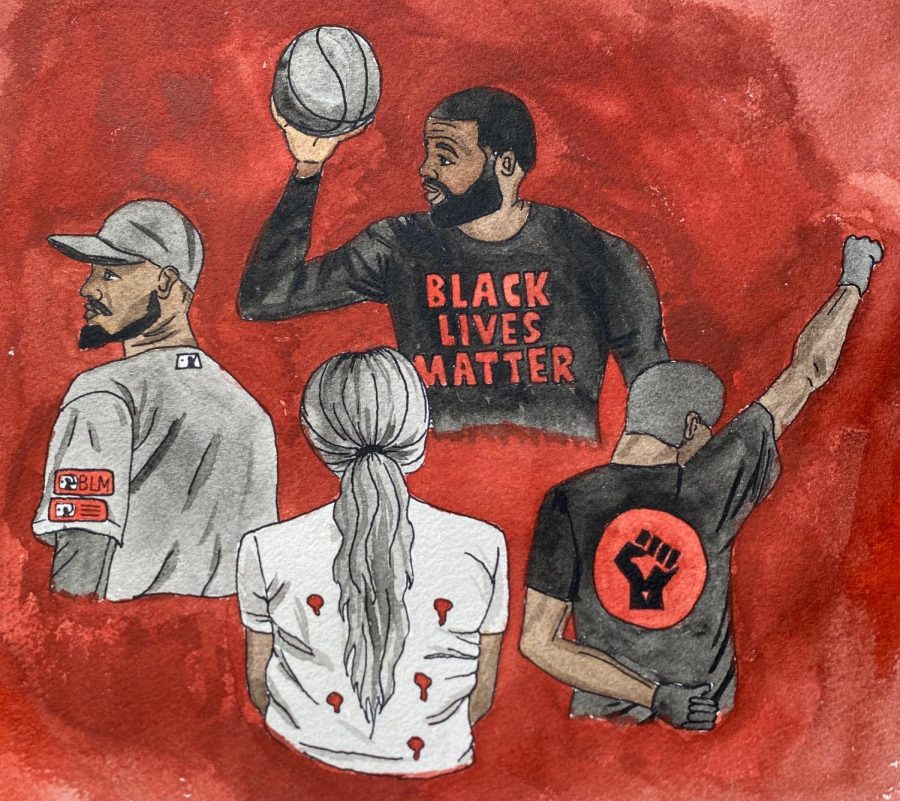Athlete boycott halts sports in response to Jacob Blake shooting
September 2, 2020
Last week, professional sports in the U.S. stopped for the second time this year due to an athlete boycott.
The first time, it was the COVID-19 pandemic that halted most sports globally. This pandemic, perhaps the most unifying event recorded in human history, necessitated limited interaction between athletes for public safety purposes.
All of humanity is likely susceptible to the COVID-19 virus, athletes and fans included. Like all large gatherings, sporting events were required to stop.
For many fans, it was a relief to have sports return, almost functioning as a return to normalcy. Then, on Aug. 26, sports ground to a halt again.
The second stoppage resulted from the divisions still plaguing humanity rather than from the common, shared experience of the pandemic. For generations, people of color have endured discrimination in the U.S. While racism is not uniquely an American issue, it is embedded in the political, economic and social institutions of the United States.
After the shooting of Jacob Blake by Wisconsin police and the subsequent protests, the NBA’s Milwaukee Bucks were the first team to take action. Shortly before tip-off on Aug. 26, during the first round of the playoffs while the opposing Orlando Magic were warming up, the Bucks refused to take the floor.
https://www.instagram.com/p/CEYQmV7ATdP/
Bucks players, led by outspoken veteran guard George Hill, declined to play to protest the continued issue of police brutality and systemic discrimination towards BIPOC. Only months removed from the George Floyd protests, the players made a stand to show their displeasure with the apparent lack of progress and change.
The Magic declined to accept the forfeit and instead boycotted the game as well. Within hours, the entire NBA season had been postponed. Other sports organizations quickly followed suit. MLB, MLS and WNBA all had games postponed in solidarity with those continuing to be affected by discrimination.
All of the leagues involved resumed play later in the week. While some outlets and pundits proclaimed that it was an empty and ineffective gesture by the athletes, the importance of the boycotts cannot be understated.
Sports fans witnessed their athletes, their entertainers and role models voice their concern for an issue impacting every American. Despite what Laura Ingraham famously told LeBron James, it is no longer an option for athletes to “shut up and dribble.”
As athletes become increasingly influential with the growth of social media and the personal brand, they are able to advocate for causes close to them. Many athletes have already begun to contribute and give back to their communities. The boycotts are simply a continuation of this practice.
The resumption of professional sports uplifted fans during this pandemic. It is imperative, however, for all fans to consider the larger problems their athletes are experiencing. The boycotts reminded society that sports, contrary to how many avid fans feel, are not the biggest thing going on at the moment.
One of the greatest calls to action made by the NBA, and other sports leagues as a result of the boycott, was the urge to vote. In a joint statement from the NBA and the National Basketball Players Association, the league promised to make efforts to, “[increase] access to voting, [promote] civic engagement, and [advocate] for meaningful police and criminal justice reform.”
The NBA and NBPA have put out the following joint statement about play resuming Saturday, along with initiatives the players and league will work on together: pic.twitter.com/2Y2e9eFEfd
— Tim Bontemps (@TimBontemps) August 28, 2020
























Larry Masters • Sep 9, 2020 at 10:53 am
Where is the MeToo movement when you need it? Jacob Blake was violating a protective order that was issued for his alleged sexual assault of his former partner. He fought with police and was reaching into his car when he was shot. I wish the encounter did not end in his shooting, but he was solely responsible for creating the situation that led to police action.
Again, I don’t wish paralysis on anybody, but I also want women to be free from domestic violence. He was told by the court system to stay away from and warned of the consequences, but he went anyway. He did not comply with the police. He posed a real and credible threat in an avoidable situation. I not sure he is the martyr I would choose.